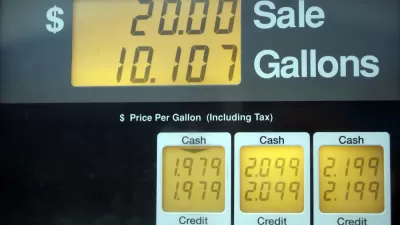Southern California's powerful regional planning association is one of the many public agencies across the United States that sees the future of road funding in a new technology called a 'black box'.

Evan Halper writes that "(t)housands of motorists have already taken the black boxes, some of which have Global Positioning System (GPS), for a test drive." The black box, already mandated under MAP-21 (see below), could be the missing link in equipping all motor vehicles with the technology to enable transportation funding to switch from being based on gas taxes to a system of mileage-based user fees (MBUF), also referred to as vehicle-miles-traveled fees.
The devices, which track every mile a motorist drives and transmit that information to bureaucrats, are at the center of a controversial attempt in Washington and state planning offices to overhaul the outdated system for funding America's major roads.
In California, the latest push (the Bay Area already has joined the movement) is coming from the Southern California Association of Governments.
"This really is a must for our nation. It is not a matter of something we might choose to do," said Hasan Ikhrata, executive director of SCAG, which is planning for the state to start tracking miles driven by every California motorist by 2025. "There is going to be a change in how we pay these taxes. The technology is there to do it."
Lee Munnich, a transportation policy expert at the University of Minnesota, agrees. "His state recently put tracking devices on 500 cars to test out a pay-by-mile system", writes Halper.
"The gas tax is just not sustainable", he said. "This works out as the most logical alternative over the long term," he said. "This works out as the most logical alternative over the long term."
Silicon Valley to the rescue? Well, not quite - this firm is based in Long Beach, Calif.
The hunt for that technology has led some state agencies to a small California startup called True Mileage. The firm was not originally in the business of helping states tax drivers. It was seeking to break into an emerging market in auto insurance, in which drivers would pay based on their mileage. But the devices it is testing appeal to highway planners because they don't use GPS and deliver a limited amount of information, uploaded periodically by modem.
Should California move toward MBUF to shore-up sagging state transportation revenue, by no means would it be alone, writes Halper.
Several states and cities are nonetheless moving ahead on their own. The most eager is Oregon, which is enlisting 5,000 drivers in the country's biggest experiment. Those drivers will soon pay the mileage fees instead of gas taxes to the state. Nevada has already completed a pilot. New York City is looking into one. Illinois is trying it on a limited basis with trucks. And the I-95 Coalition, which includes 17 state transportation departments along the Eastern Seaboard (including Maryland, Pennsylvania, Virginia and Florida), is studying how they could go about implementing the change.
Black boxes are already mandated by federal legislation according to Breitbart's William Bigelow, who notes that they also go by the name "event data recorders".
In 2012, the Senate passed Senate Bill 1813, proposed by Sen. Barbara Boxer (D-CA), which required all cars to come with the black boxes by 2015. In 2005, more than 64% of cars across the nation already had them: General Motors, Ford, Isuzu, Mazda, Mitsubishi, Subaru, and Suzuki installed them in 100% of their cars. By 2013, 96% of new cars had the boxes, as well as 150 million older cars.
But is this all this a distraction? Halper writes that "(a)t the Metropolitan Transportation Commission in the San Francisco Bay Area, officials say Congress could very simply deal with the bankrupt Highway Trust Fund by raising gas taxes [as former Secretary of Transportation, Ray LaHood, just did]. An extra one-time or annual levy could be imposed on drivers of hybrids [and electric vehicles] and others whose vehicles don't use much gas, so they pay their fair share."
"There is no need for radical surgery when all you need to do is take an aspirin," said Randy Rentschler, the commission's director of legislation and public affairs. "If we do this, hundreds of millions of drivers will be concerned about their privacy and a host of other things."
FULL STORY: A black box in your car? Some see a source of tax revenue

Maui's Vacation Rental Debate Turns Ugly
Verbal attacks, misinformation campaigns and fistfights plague a high-stakes debate to convert thousands of vacation rentals into long-term housing.

Planetizen Federal Action Tracker
A weekly monitor of how Trump’s orders and actions are impacting planners and planning in America.

In Urban Planning, AI Prompting Could be the New Design Thinking
Creativity has long been key to great urban design. What if we see AI as our new creative partner?

King County Supportive Housing Program Offers Hope for Unhoused Residents
The county is taking a ‘Housing First’ approach that prioritizes getting people into housing, then offering wraparound supportive services.

Researchers Use AI to Get Clearer Picture of US Housing
Analysts are using artificial intelligence to supercharge their research by allowing them to comb through data faster. Though these AI tools can be error prone, they save time and housing researchers are optimistic about the future.

Making Shared Micromobility More Inclusive
Cities and shared mobility system operators can do more to include people with disabilities in planning and operations, per a new report.
Urban Design for Planners 1: Software Tools
This six-course series explores essential urban design concepts using open source software and equips planners with the tools they need to participate fully in the urban design process.
Planning for Universal Design
Learn the tools for implementing Universal Design in planning regulations.
planning NEXT
Appalachian Highlands Housing Partners
Mpact (founded as Rail~Volution)
City of Camden Redevelopment Agency
City of Astoria
City of Portland
City of Laramie



























